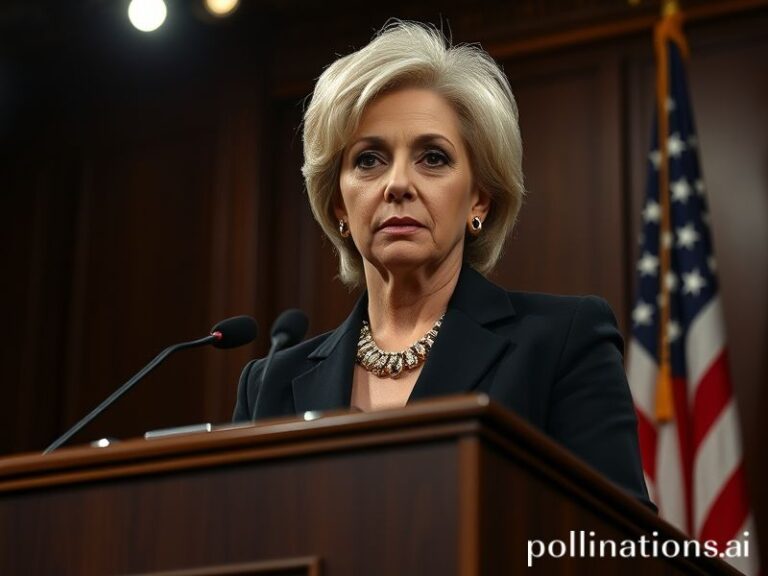From Lagos to Lisbon: How AT&T’s $7 Data Breach Settlement Became a Global Punchline
AT&T Finally Pays the Tab for Its World Tour of Negligence, or: How to Settle for Less Than Your Data Is Worth
Geneva—While delegates at the UN were busy arguing over the precise definition of “cyber-war,” roughly 70 million former and current AT&T customers received an email this week that was part apology, part ransom note, and entirely overdue. The subject line read: “Your Personal Information Was Stolen. Here’s $7.” The decimal point is not a typo.
Yes, the telecom titan that once promised to “connect the world” has admitted it did so with all the cybersecurity finesse of a drunk tourist shouting his PIN at an ATM in Bangkok. The settlement—hammered out in a San Francisco courtroom but ping-ponged through servers on three continents—covers breaches dating back to 2019, 2021, and 2023, the digital equivalent of leaving your diary on the nightstand every time you check out of a hostel.
Across the planet, reactions ranged from the performatively shocked (Brussels regulators who still think GDPR is a magic spell) to the grimly unsurprised (São Paulo fintech workers who use burner emails for grocery lists). In Lagos, a cybersecurity consultant laughed so hard his generator ran out of fuel. “Seventy million people, one credit monitoring voucher,” he wheezed, “even our 419 scammers have higher profit margins.”
The settlement’s global footprint is instructive. AT&T’s roaming agreements mean the leaked data includes call records from U.S. soldiers stationed in Djibouti, metadata from NGO workers in Cox’s Bazar, and the precise moment a British backpacker in Bali phoned his mum to confess he’d maxed out the Monzo card. All of it now circulates on dark-web marketplaces alongside Bolivian voter rolls and the Turkish Railway’s employee database—an international buffet of bureaucratic despair.
To collect the aforementioned seven dollars—or up to $25 for the fraction who can prove actual identity theft—claimants must navigate a portal that auto-detects their country and greets them in Comic Sans, a typographic war crime under the Geneva Conventions. Europeans receive an additional cookie-consent pop-up, because irony is the only renewable resource the EU still exports.
Meanwhile, the broader significance is hard to miss: this is the third mega-settlement this year to value a human identity at less than the price of a craft beer in Copenhagen. The calculus appears to be: if data is the new oil, then AT&T just spilled the Exxon Valdez and is offering every affected sea otter a coupon for 10% off their next tanker ride.
International observers note the deal’s ripple effects. Telcos in Jakarta and Nairobi are citing it as precedent—“See, negligence is just a line item.” Australian regulators, still dizzy from the Optus and Medibank breaches, have adopted the corporate chill-out technique known as “thoughts and prayers.” And in Moscow, state media gleefully reported the payout as proof that American capitalism devours its young at bargain-basement prices.
Back in Washington, AT&T’s stock closed up 2%. Markets, like sociopaths, are wonderfully consistent. Analysts praised the firm for “limiting financial exposure,” which is banker-speak for “getting away with it.” Somewhere, an AI compliance officer wrote a glowing report about “enhanced security protocols,” then updated its résumé before the next vulnerability report drops.
The deadline to file a claim is October 30. Miss it, and your compensation defaults to a single free month of HBO Max—ironic, since the only thing you’ll want to binge afterward is the sweet oblivion of sleep.
In conclusion, the AT&T settlement is a masterclass in multinational misdirection: pay pennies, promise progress, and pray the next breach waits until after earnings season. For the rest of us, it’s a gentle reminder that in the global village, the burglars have keys, the watchmen are asleep, and the village council just voted to split the cost of a new lock—minus administrative fees.
So claim your $7 while you can. With inflation, it might soon be worth an actual phone call—assuming anyone still answers unknown numbers.







